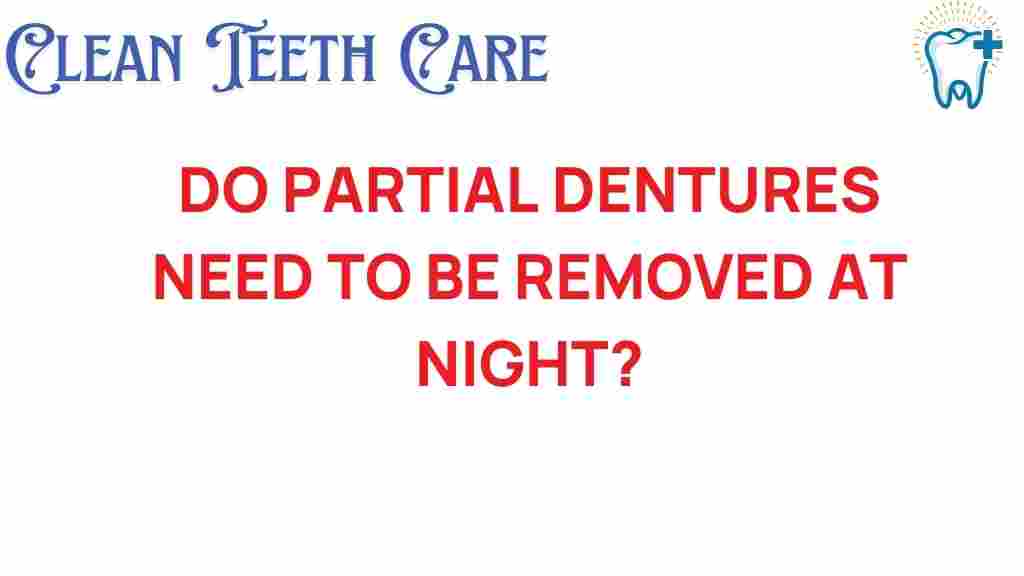Do Partial Dentures Require Nightly Removal?
If you’re considering or already using partial dentures, you may have heard a variety of opinions about whether they should be removed at night. This article will uncover the truth behind the need for nightly removal of partial dentures, focusing on their impact on oral health, nighttime care, dental hygiene, and more. We will also debunk common myths and provide patient advice and dental tips to ensure your comfort and well-being.
Understanding Partial Dentures
Partial dentures are removable dental appliances designed to replace one or more missing teeth. They not only restore functionality but also improve aesthetics by filling gaps in your smile. However, as with any dental device, proper care and maintenance are crucial for your overall oral health.
Why Nighttime Care Matters
Nighttime care for partial dentures is essential for several reasons:
- Preventing Bacterial Growth: Leaving partial dentures in during the night can promote bacterial growth, leading to potential oral health issues.
- Maintaining Oral Hygiene: Removing dentures allows for a thorough cleaning of both the dentures and your natural teeth and gums.
- Reducing Discomfort: Some patients experience discomfort or soreness when wearing partial dentures continuously.
Do Partial Dentures Require Nightly Removal for Optimal Oral Health?
The short answer is yes; for optimal oral health, it is generally recommended to remove partial dentures at night. Here are some key reasons to support this advice:
1. Improved Cleaning
When you remove your partial dentures at night, you can clean them thoroughly without obstruction. This helps remove food particles, plaque, and tartar that can accumulate on the dentures and your natural teeth. Regular cleaning is vital for preventing gum disease and other oral health issues.
2. Reduced Risk of Gum Irritation
Wearing partial dentures continuously can cause gum irritation and soreness. By removing them at night, you give your gums a chance to rest and recover, reducing the risk of discomfort and inflammation.
3. Enhanced Comfort
Many users report that removing their partial dentures at night leads to better sleep quality. If you find that your dentures are uncomfortable or cause you to grind your teeth, taking them out can improve your overall comfort.
4. Prevention of Bad Breath
Food particles trapped beneath or around your partial dentures can lead to bad breath. Nightly removal and cleaning can help maintain fresh breath by preventing the buildup of odor-causing bacteria.
5. Myths About Nighttime Removal
Let’s address some common myths surrounding the removal of partial dentures at night:
- Myth 1: “You should always wear your dentures to keep them fitting properly.”
Reality: While it’s important to ensure a good fit, wearing them continuously can lead to oral health issues. - Myth 2: “Removing dentures at night will damage them.”
Reality: Proper storage and care can prolong the life of your dentures. - Myth 3: “You can’t sleep without your dentures in.”
Reality: Many people find it more comfortable to sleep without them.
Step-by-Step Nighttime Care for Partial Dentures
To maintain good oral hygiene and comfort, follow these steps for nighttime care of your partial dentures:
Step 1: Remove Your Dentures
Gently remove your partial dentures, taking care not to damage them or irritate your gums. If you’re unsure how to do this properly, consult your dentist for guidance.
Step 2: Rinse Your Mouth
After removing your dentures, rinse your mouth with water or an antimicrobial mouthwash to help eliminate any food particles and bacteria.
Step 3: Clean Your Dentures
Use a soft-bristled toothbrush and a non-abrasive denture cleaner to thoroughly clean your dentures. Avoid using regular toothpaste, as it can be too abrasive.
Step 4: Soak Your Dentures
Place your dentures in a denture-soaking solution overnight. This helps to keep them moist and prevents them from warping. Always follow the manufacturer’s instructions for soaking solutions.
Step 5: Clean Your Natural Teeth and Gums
Brush your natural teeth and gums thoroughly to remove plaque and food particles. Don’t forget to use dental floss to clean between your teeth.
Step 6: Store Your Dentures Properly
Keep your dentures in a clean, dry container while they soak. It’s best to store them in a safe place away from pets and small children.
Step 7: Visit Your Dentist Regularly
Regular dental check-ups are essential for maintaining your oral health and ensuring that your partial dentures fit properly. Your dentist can provide tailored advice and adjustments as needed.
Troubleshooting Common Issues with Partial Dentures
While caring for your partial dentures, you may encounter some common issues. Here are tips for troubleshooting:
1. Soreness or Discomfort
If you experience soreness, it may be due to an ill-fitting denture. Consult your dentist for adjustments or relining to improve comfort.
2. Difficulty Eating
Gradually reintroduce different foods into your diet. Start with softer foods and slowly work your way up to harder items. If issues persist, consult your dentist.
3. Bad Odor
Persistent bad odor can be a sign of poor cleaning. Ensure you’re thoroughly cleaning your dentures and using an effective soaking solution. If the problem continues, see your dentist.
4. Stains on Dentures
If your dentures become stained, consult your dentist for professional cleaning options. Avoid products that can damage the material.
Conclusion: Prioritize Your Oral Health with Proper Denture Care
In conclusion, removing partial dentures at night is highly recommended for optimal oral health. It promotes better cleaning, reduces discomfort, and prevents various oral health issues. By following the outlined nighttime care routine and addressing any common issues, you can enjoy the benefits of partial dentures while maintaining excellent dental hygiene.
For more information on denture care and oral health tips, consult your dentist or visit reputable resources like the American Dental Association. Remember, your comfort and health should always come first!
For expert advice on maintaining your dental hygiene, check out our comprehensive guide here.
This article is in the category Hygiene and created by CleanTeethCare Team
